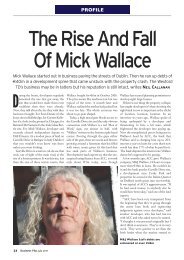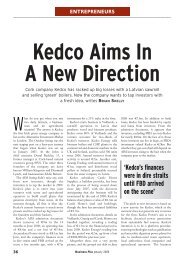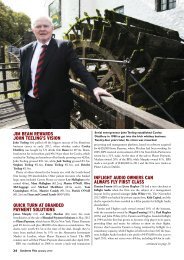Accountants Who's Who - Business Plus Online
Accountants Who's Who - Business Plus Online
Accountants Who's Who - Business Plus Online
Create successful ePaper yourself
Turn your PDF publications into a flip-book with our unique Google optimized e-Paper software.
BP SURVEY<br />
ACCOUNTANTS<br />
face in dealing with someone who has<br />
availed of a remedy under the new regime.<br />
Mark Kennedy (Mazars): It will take a<br />
while for entrepreneurs to gain confidence<br />
in the new personal insolvency regime. If<br />
the entrepreneur has enough time left in<br />
their career to recover from their financial<br />
problems when they emerge from the<br />
process, then they may very well consider<br />
engaging in the personal insolvency<br />
regime.<br />
Brendan Jennings (Deloitte): We are<br />
focused on ensuring that we have the<br />
capacity to support agreements reached<br />
under the new rules, but also to provide<br />
advice on the full range of potential<br />
solutions which banks and borrowers will<br />
need to consider. The personal insolvency<br />
arrangements, which will concern secured<br />
debt up to a limit of €3m, envisage some<br />
form of debt write-off. There is definitely<br />
an appetite for PIAs among people who<br />
are insolvent.<br />
Brian Conroy (Crowe Horwath): We<br />
expect the new regime will facilitate direct<br />
Mark Kennedy: “It will take a while<br />
for entrepreneurs to gain confidence<br />
in the new insolvency regime”<br />
negotiation between the borrower and<br />
banks. The banks want to have the full<br />
picture before they will engage in<br />
restructuring discussions and borrowers<br />
need to be mindful of this.<br />
Paul Leonard (Cooney Carey): The<br />
question is how long it will take for the<br />
banks to embrace the Personal Insolvency<br />
Act, rather than fear it. At the moment,<br />
most banks only allow debt forgiveness in<br />
exceptional cases. So some borrowers can<br />
get stuck in “limbo”, i.e. if they can’t repay<br />
all of the debt, why should they repay any<br />
of it This legislation will allow banks to<br />
develop solutions to ensure their<br />
borrowers are motivated to repay as much<br />
as possible.<br />
Tadhg O’Sullivan (OSK): The new law<br />
finally clarifies the previous uncertainty<br />
brought about by the absence of nonjudicial<br />
debt settlement arrangements,<br />
the lack of which was a barrier to both<br />
borrowers and lenders. However, I would<br />
have reservations about how the regime<br />
will operate in practice.<br />
Andy Quinn (Moore Stephens Nathans):<br />
The personal insolvency legislation will<br />
work in giving beleaguered entrepreneurs<br />
a second chance if the banks act promptly<br />
and realistically in putting debt settlement<br />
and personal insolvency arrangements in<br />
place. I also think that the future profits of<br />
the banks will benefit from allowing debt<br />
write-downs now.<br />
Survey continued on page 76
















